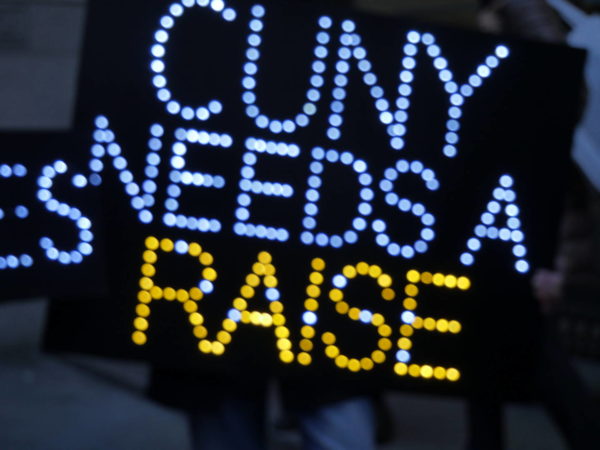New York, NY – The last time faulty and staff at the City University of New York tried to secure a fair contract, it took them six

interminable years to get a deal done. On Monday night, they held rallies and marched on CUNY trustees determined to avoid a similar agony.
That previous six-long-year battle might have resulted in significant gains for the 30,000 workers that the Professional Staff Congress [PSAC] represents. But the union maintains salaries for fully-tenured CUNY professors still lag far behind those offered at other institutes of higher learning; while CUNY’s 12,000 part-time adjunct professors continue to scrape by despite handling most of the teaching duties.
This time out, the PSC is seeking 5-percent, across-the-board raises for all titles, as well as a baseline $7,000 per course salary for those hardworking adjuncts.
“Our members, in the survey we did last spring, said definitely, they want a speedier contract settlement this time,” PSC-CUNY

Treasurer Sharon Persinger told LaborPress this week. “But, we also have significant demands for significant increases, which really means more funding for the university, so…it’s going to be tough.”
The union has already formerly called on the CUNY Board of Trustees to begin bargaining. At the time of this writing, no meetings have yet been scheduled.
Heading into the waning days of 2017, CUNY faculty and staff may not have billionaire Mayor Mike Bloomberg and his austerity agenda to tangle with, but they do have Donald Trump in the White House, and that concerns many.
“My worries… a lot of them have to do with the consequences of what’s going on in Washington,” Persinger continued. “The tax bills that still have to be reconciled…the things have been proposed would really be devastating for states like New York that have higher property and income taxes. And with that money, they provide services that some other places don’t have.”
Distinguished CUNY Professor Frances Fox Piven called Trump “the clown that is kind of the insignia of a crazed Republican Party that is in power in all three branches of government.”
“It’s a very strange time in American politics isn’t it?” Professor Piven said outside the CUNY Graduate Center on 5th Avenue Monday afternoon. “And it’s hard to take your eyes off the television set, or off your computer screen. Where you’re hearing about bizarre, crazy plots with foreign countries at the same time they are planning to actually steal money from working and poor families in order to reward the corporate biggies.”
Instead of rewarding the U.S. oligarchy, CUNY faculty and staff insist that monies be invested into the institution to ensure it continues to be a world-class center for higher learning. And part of that means helping faculty and staff make up all the ground lost under Bloomberg.
“The last contract took six years to settle — that’s because CUNY didn’t put any money on the table for five years,” Bowen told LaborPress. “That contract made some significant advances. It raised salaries. It kept even with inflation. It made some really big gains for professional staff; job security for adjuncts. But it has not restored our salaries to a competitive level. And when salaries at Columbia, Rutgers, Pace, Fordham, Stony Brook are $30,000 or more for a professor — people who teach at CUNY are often finding it hard to stay.”
According to Professor Piven, a degraded CUNY due to lack of investment is something the nation can ill-afford to allow happen.
“The United States is losing standing every which way — militarily, financially, in it’s productivity — but there is one institution in

the United States of which we can still be proud and which the world admires — and that’s our universities, and especially, our public universities.”
About half a million students study at CUNY schools througout the city. Some adjunct professors, however, subsist on as little at $27,000 a year. Some are on food stamps.
“CUNY’s faculty and staff are among the best in the world, and the quality education they provide to New York City’s students helps prepare them to take their place in a global workforce,” New York City Central Labor Council President Vinny Alvarez said in a statement. “These workers have continued to provide this quality education despite being compensated at levels much lower than comparable positions at other local colleges and universities.”
After the six long years it took to secure their previous contract, Persinger said that she has learned the value of “determined collective persistence.”
“We were in tough political times with Bloomberg the mayor last time,” she said. “I think we’re in tough political time now because of the things going on in Washington.”



